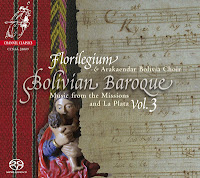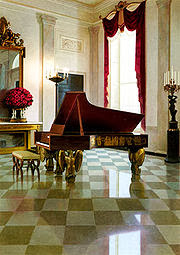In review--Baroque Andes-Style
Bolivian Baroque, Vol. 3
Music from the Missions and La Plata
Channel Classics (distributed by Harmonia Mundi)
When I think of Bolivian music, Andes folkloric traditions surface with panpipes, traditional flutes, charango (a lute made from an armadillo) and bombo drum. I had never connected European baroque music with the South American country, but of course it makes sense that the Spanish colonists and missionaries would have brought baroque music with them.
For those of you not familiar with Bolivia, the landlocked South American country is bordered by Peru and Chile on the west, Brazil on the northeast, Paraguay and Argentina in the south. The Andes country’s population is comprised of Afro-Bolivians, Spanish descent, and Creole. However, the majority of Bolivians are Indians of pure Aymara and Quechua backgrounds.
So this brings us to the English baroque ensemble Florilegium and the Arakaendar Bolivian Choir (comprised of singers of American Indian descent) recording, Bolivian Baroque, Vol. 3. The recording provides both baroque instrumental pieces performed on organ and period instruments, as well as, sacred choral music once performed by the Indians that converted to Catholicism in the missions of Bolivia.
The intriguing liner notes provide the historical significance of this music along with information about the missionary composers of that era. We also learn about the church organs built by Indians and we are introduced to poly choral music (music composed to be performed by two or three choirs at a time). So besides, this unique musical experience, there’s a lot of information to digest. The recording immerses listeners in gorgeous choral pieces sung in lilting mixed voices, organ toccatas performed by British keyboardist James Johnstone and baroque sonatas performed by the small period ensemble, Florilegium.
Music director Ashley Solomon, also hailing from the UK founded the Bolivian choir which consists of indigenous vocalists. He travels regularly between England and Bolivia working with the choir, researching Bolivia’s archives and touring the choir in Europe and its homeland. He was awarded the Hans Roth Prize for his work with the choir. According to the liner notes, “This prestigious Bolivian award has been given to him in recognition of the enormous assistance he has given to the Bolivian native Indians, their presence on the international stage and the promotion and preservation of this music.”
While I don’t normally listen to baroque organ music (reminds me too much of church), the organ performances on this CD can only be called thrilling and astounding. You might add archival to the list of adjectives since Johnstone performed the works on a Bolivian mission organ (built by Indians). The mixed choir serves up stunning vocals and rich harmonies (take a listen to Al Llanto mas tierno composed by Juan de Araujo). And the instrumental pieces performed by the ensemble, especially Sonata No. IV composed by an anonymous source glistens. The shimmering flute on the second movement, Andante captured my attention. The recording ends with a folkloric piece, not related to the baroque era, “Little Orange” which is performed by the choir and backed by a Andes traditional lute, charango.
This recording is not the first I’ve heard of European Catholic church music performed by indigenous people of the New World, but it is the first I’ve heard from South America. The recording offers an earful of phenomenal music, especially for fans of the baroque era music, but it also offers a glimpse into a history unknown to most of the world. And if you’re wondering if the music has a healing effect, the answer is a resounding yes. Baroque music lends itself to good digestion (listen to while eating a meal), retaining information while studying and I’ve found listening to it helps with writing blocks.
http://www.channelclassics.com/




Comments
Post a Comment